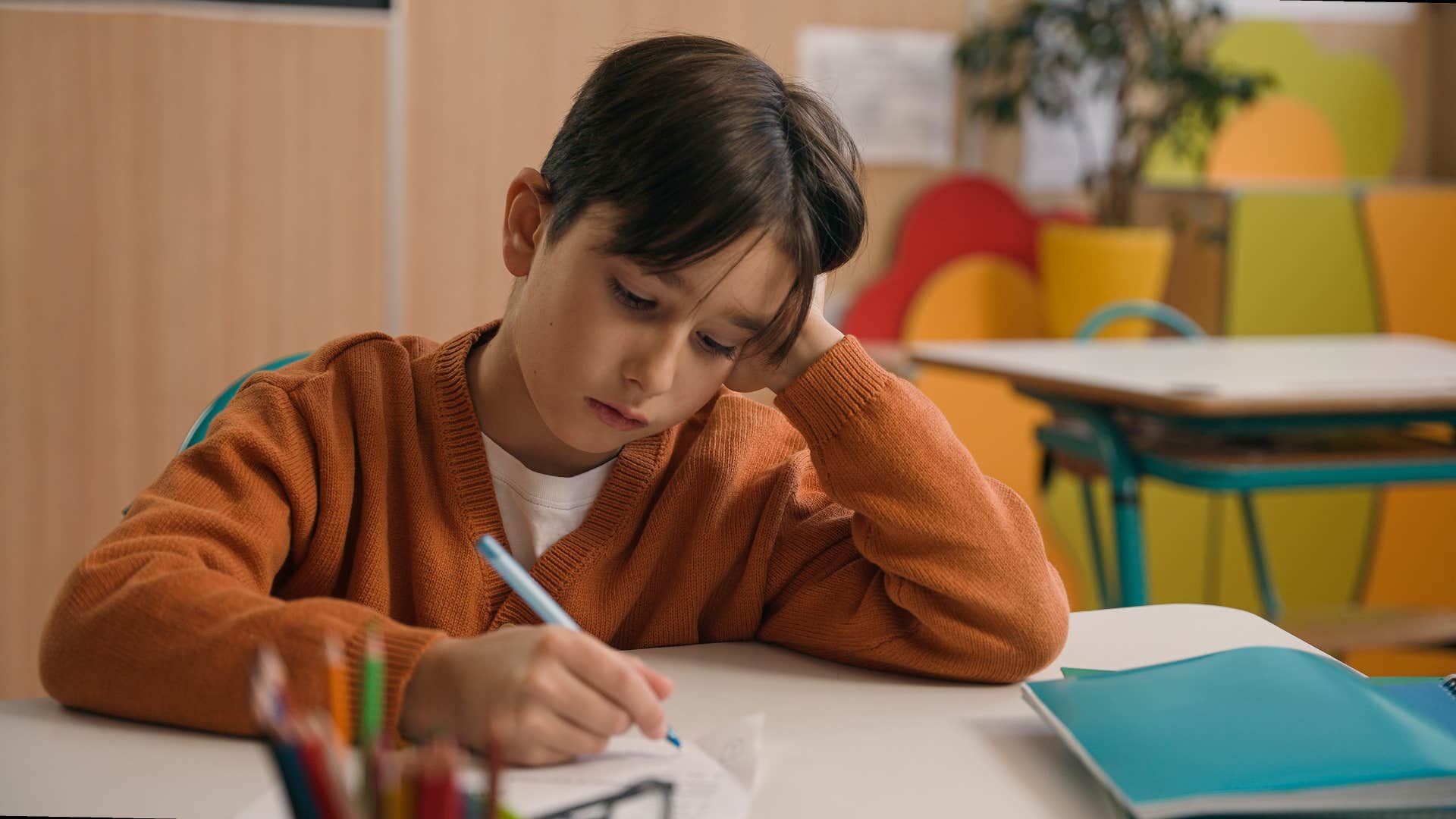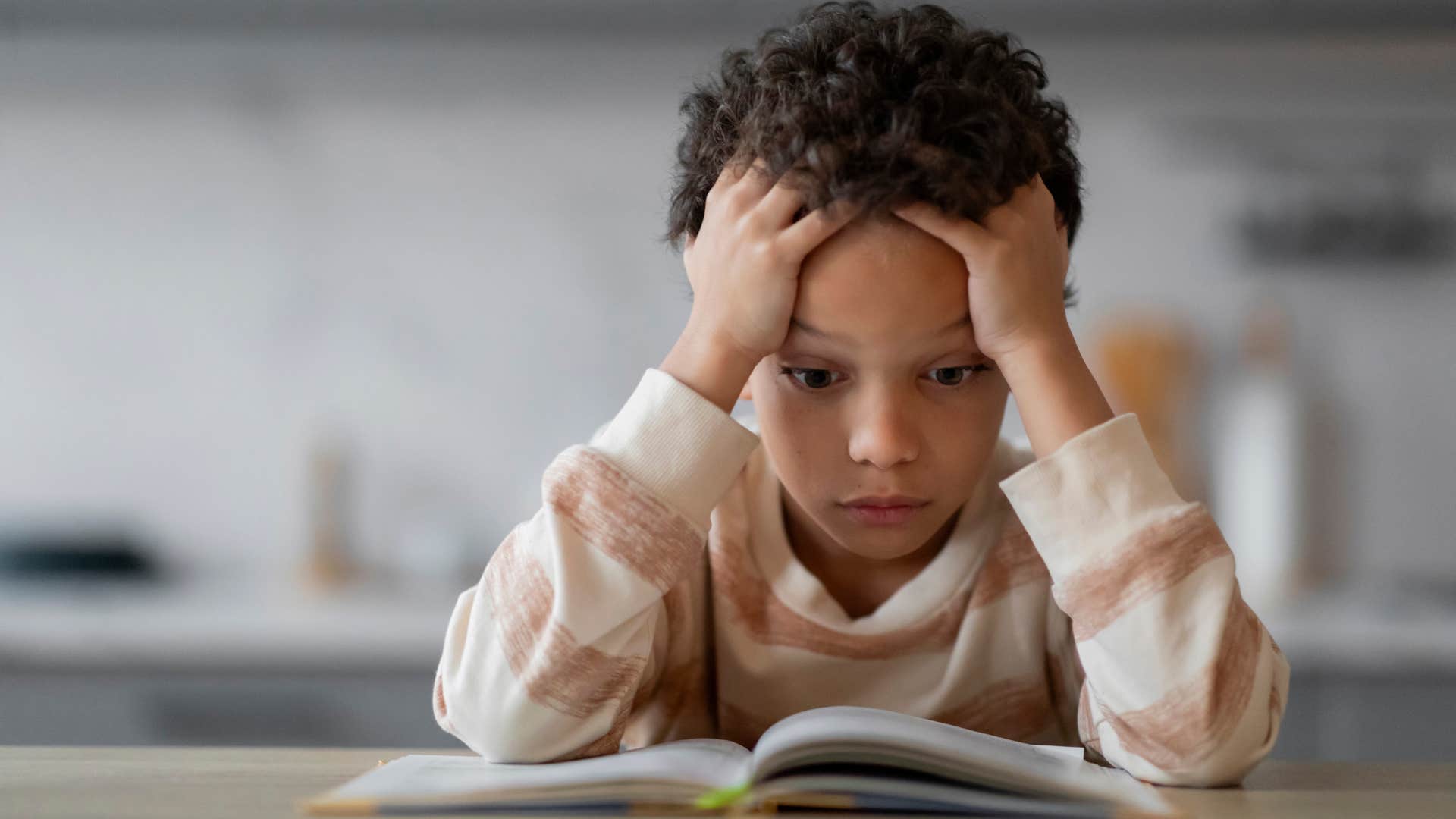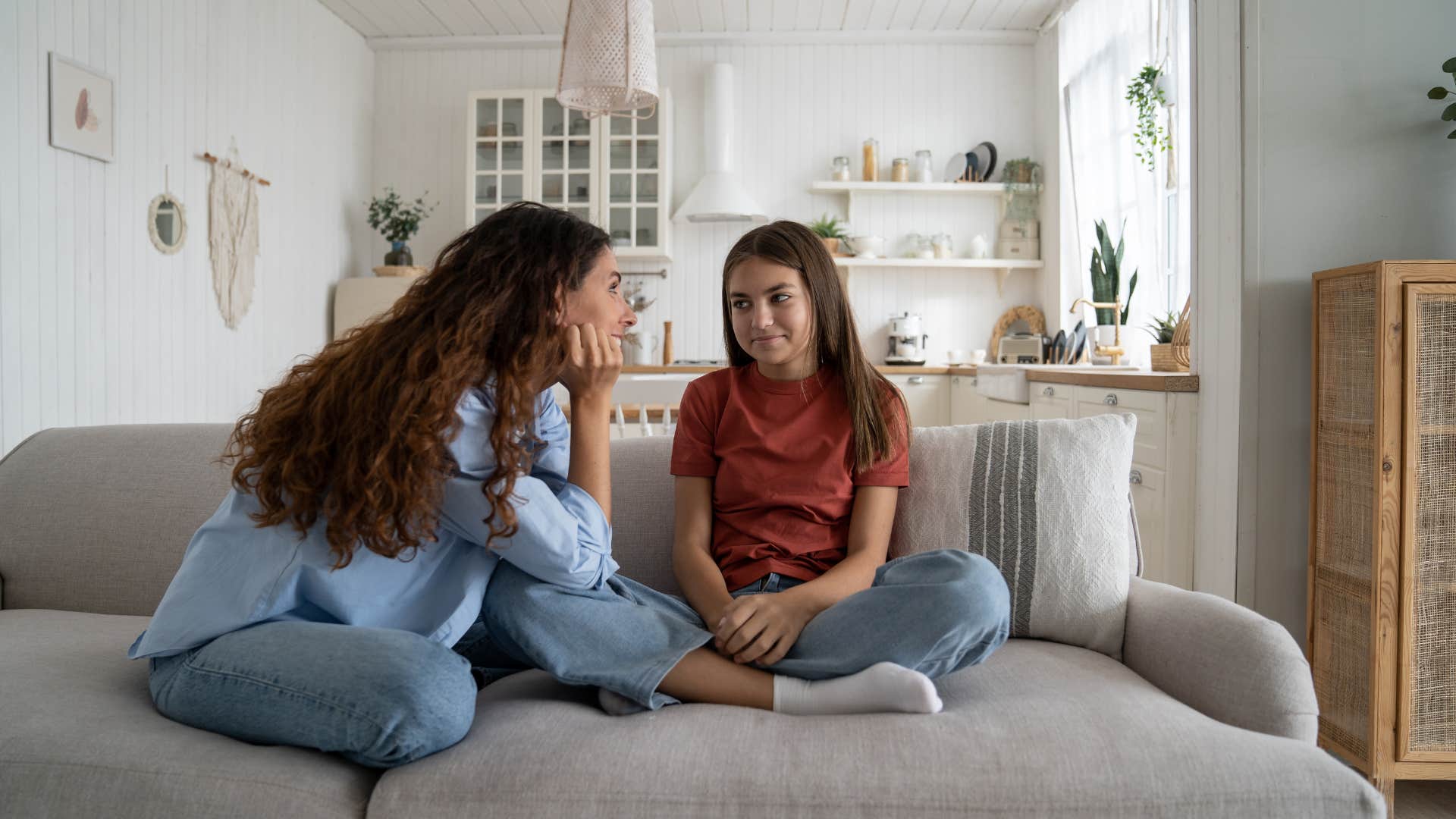11 Things Parents Should Really Know About Their Kids But Teachers Aren’t Allowed To Tell Them
Teachers spend most of the day with your children and can see the things you may miss out on.
 Krakenimages.com | Shutterstock
Krakenimages.com | Shutterstock Parenting is truly one of the toughest jobs that a person can have. All that most parents want is for their kids to be happy and thriving, but because they spend so much time at school during their formative years, it can be hard to see and hear everything they may need. Teachers are often the ones who spend the most time with any given child, so they see struggles and triumphs that parents may miss at home. But because of the environment created by our educational system, there are many things parents should really know about their kids that teachers aren't allowed to tell them.
Parents are often kept in the dark about some of the more important details they should know about their kids, which would help them better understand and support them. It can also be hard for parents to hear information about their kids that they weren't able to come to on their own. It can make them feel as if they're doing an inadequate job, but in reality, it doesn't reflect on their parenting at all. As long as they dedicate themselves to being the support system their child needs, that's the most important thing.
Here are 11 things parents should really know about their kids but teachers aren't allowed to tell them
1. They're exhausted and it's hurting their ability to learn
 PeopleImages.com - Yuri A | Shutterstock
PeopleImages.com - Yuri A | Shutterstock
Many kids are truly running on empty, and their parents may not even realize it or want to take it seriously. Whether it's because they're staying up late in their rooms or just have too much on their plates, many kids are coming to school and struggling to learn due to their exhaustion. Teachers notice that they're coming into the classroom yawning, struggling to concentrate, and just straight-up zoning out when being asked questions.
One study published in the Journal of Pediatrics even found evidence that inadequate sleep affects a child’s positive development. Because kids aren't always able to articulate the root of their exhaustion, it can just be mislabeled as them being lazy. Teachers are the ones who see it every single day and wish they could just alert their parents about the fatigue their child feels. Sleep really does matter, and kids, like adults, need their time to rest and get their energy back.
2. They crave your attention more than you realize
 PeopleImages.com - Yuri A | Shutterstock
PeopleImages.com - Yuri A | Shutterstock
Even if a child may seem as if they're quite independent and can handle things on their own, teachers are able to tell when that child is actually just craving attention and approval from their parents. A child may not always say it, or even know how to verbalize what they're missing in the dynamic between them and their child, but they truly need that kind of connection at home.
"In order for our kids to feel soothed, we have to tune in to when they are distressed. We should aim to offer comfort and support that reflects what they are going through. We can draw them out and listen to what they are experiencing, reflecting their thoughts and feelings back to them, so they feel understood," insisted clinical psychologist Lisa Firestone.
Teachers notice when a child immediately lights up when one of their friends compliments them about their work, or laughs at a joke they've made. They also notice that when kids are acting out in the classroom, it could be because they aren't getting the attention they need at home.
3. They want rules that actually make sense
 DimaBerlin | Shutterstock
DimaBerlin | Shutterstock
Most kids, despite what parents may think, don't actually hate the rules that are imposed on them. But when the rules feel unfair and even random, that's when they tend to act out and become disobedient. Teachers are able to see this all the time when a child challenges a rule in the classroom. It's not that they're trying to rebel or be a distraction, but it's because they genuinely don't understand why that rule has to exist.
"Sure, kids need 'discipline.' But the verb 'to discipline' means 'to guide.' There is absolutely no reason why our guidance needs to be punitive. We can't really control another person. All we really have to work with is influence. And punishment erodes that influence," pointed out parenting expert Laura Markham.
Children are honestly more willing to follow boundaries when the reasoning behind them is made clear, but most parents don't think they should have to explain themselves to their own kids. Teachers wish that parents knew just how much their kids actually crave structure, but on top of that, they crave respect, too. Just because they're kids doesn't mean they aren't worthy of being respected, and part of that respect means helping them see the value in the boundaries that exist as they're growing up.
4. They're deeply anxious but hide it well
 DimaBerlin | Shutterstock
DimaBerlin | Shutterstock
Many kids are walking into school every single day carrying this weight of anxiety that their parents just aren't able to see. The reason why it's hard to spot is that these kids are smiling, laughing, and even participating, so it seems as if they're doing fine. But underneath the surface of their happy-go-lucky attitude, they're battling against stress, overthinking every interaction, and even panicking about the small mistakes they make that don't really matter in the grand scheme of things.
"Children as well as adults experience anxiety and stress all day long. If untreated, anxiety and stress can lead to long-term, debilitating emotional and physical problems. Even the loss of sleep can stress your child and make them anxious," warned family and child development expert Gail Gross.
Teachers can spot this anxiety, but because it's not hindering their ability to perform well in the classroom, mentioning it to their parents can seem like a bit of an overstep. Kids have also just learned how to mask their anxiety because they may not want to be a burden, not realizing that their parents only want to make sure they're succeeding in every avenue of life, especially mentally and emotionally.
5. They compare themselves to everyone
 MAYA LAB | Shutterstock
MAYA LAB | Shutterstock
Even at such a young age, kids struggle just like adults do with comparison culture. They can't help but notice if their classmate next to them is reading at a faster pace than they are, or is getting the most attention from other kids in their class. It's quite easy for them to internalize that and wonder why they can't get the same kind of attention, and of course, teachers can clock it happening in the moment.
It might seem as if the comparisons a child makes to their friend or peer aren't deep at all, but over time, it can really chip away at their self-worth. It can also hinder their performance because they may believe they're falling short when they're actually not. Teachers wish that parents could see how this quiet comparison can truly affect their child's well-being. They need to be reminded of their value and how unique they are, and why that matters more than trying to be the same as everyone else.
"Above all, show and tell your child you love them. Create and nurture a safe home environment where your child feels loved. Spend one-on-one time with your child every day," encouraged mental health expert Eileen Bailey.
6. They're more observant than you think
 fizkes | Shutterstock
fizkes | Shutterstock
Just because kids are young and don't have the vocabulary yet to fully express themselves, it doesn't mean they aren't observing the things happening around them. They're quite in tune to the moods and body language of those around them, especially their parents. Teachers are able to see the impact that this kind of awareness has on a child and how the attitude they bring to the classroom may be a result of what they're seeing at home.
Relationship expert Beverly D. Flaxington explained to parents, "The kids of today are the adults of the future and modeling the behavior you want, rather than what you don’t want is really key."
A child doesn't need a perfect parent, but they need one who's honest. When kids are able to see their parents showing the importance of being emotionally aware and confronting the feelings that they have as soon as they come to you, they'll mimic that behavior as well. They'll learn to cope with their various emotions instead of acting out or brushing things under the rug.
7. They often feel powerless
 Prostock-studio | Shutterstock
Prostock-studio | Shutterstock
Kids spend most of their time hearing about the things they need to do and being told when and how to do them. From the moment they wake up to the second they put their head on that pillow at night, they're expected to always follow instructions. While these boundaries are necessary, it can be easy for parents to forget that their kids should also have space to make some choices of their own about their lives, because it is still their life.
That lack of control can leave them feeling quite powerless, and teachers are able to see that frustration at not being heard. It shows up in the classroom when they shut down after being given directions or have a meltdown when things aren't going their way. Kids should have at least something in their day that allows them to make their own decisions, even if it's something as small as what they want to eat for dinner.
8. They notice when you're distracted
 DimaBerlin | Shutterstock
DimaBerlin | Shutterstock
Your child certainly knows the difference between when their parent is actively engaged with them versus when they're only pretending to be. This ends up having an impact on how a child interacts in their daily lives, especially in the classroom. Teachers see that when a kid starts being loud, the moment they feel they're being ignored, they'll become the opposite, which is more withdrawn, so as to not take up any space.
At home, this translates to a child feeling like they need to work extra hard just to get the attention of their parents. They just want to be seen and heard, even if their parent isn't necessarily enthused by what's being shown to them. But that's just a part of parenting. Even if you're giving your child your undivided attention for a few moments throughout the day, it'll be enough for them. Just looking at them when they speak means that your child knows you genuinely care about what they have to say.
9. They often want comfort, not just solutions
 DimaBerlin | Shutterstock
DimaBerlin | Shutterstock
When kids come to their parents because they're upset or frustrated about something, it doesn't mean they're looking to be told what they've done wrong or what they could be doing better. Instead, they just want to be comforted and told that it's fine to be upset in that moment. As parents, though, it can be hard to distinguish between when it's right to just be giving a child comfort and jumping into problem-solving mode.
While parents may have the best intentions, a child shouldn't feel like their emotions are being dismissed. This ends up coming up in the classroom when a child might become extremely emotional at the first sign of a struggle. They just want to be validated and allowed to be upset before immediately jumping into ways to fix the problem.
10. They want you to know their friends' names
 Inside Creative House | Shutterstock
Inside Creative House | Shutterstock
To a child, the friendships they have in the classroom are quite important. Parents may simply brush it off when it comes to learning the names of their kids' friends, but it means a lot to them. Teachers can see how much kids light up when the adults around them remember the names of the people they care about.
It shows that they're paying attention and genuinely want to know about the connections they're making at school. It makes them feel validated and that what matters to them also matters to their parents. Even if it's their parents remembering one or two names of their friends, it means the world to them.
11. They're just figuring things out
 Prostock-studio | Shutterstock
Prostock-studio | Shutterstock
Kids truly are just trying to figure out this life. From the friendships they have to the rules that are expected of them, kids are always trying to process the road ahead. Parents may sometimes lose their patience with their kids because they can forget that it's their first time living and navigating the world around them.
Teachers are able to see just how frustrating it is for kids when they lash out because they don't have the correct language to express themselves, and that they aren't aware of the importance of time management when they forget to turn in an assignment. Adults can sometimes expect kids to handle everything, but in reality, they're still trying to build the necessary tools to flourish. Parents should just have a bit more grace with their kids above all else.
Nia Tipton is a staff writer with a bachelor's degree in creative writing and journalism who covers news and lifestyle topics that focus on psychology, relationships, and the human experience.

